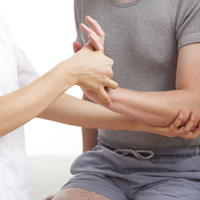
OSHA Estimates totals for foot and hand types of injuries annually at 320,000 hand and finger injuries, 70,000 eye injuries, 70,000 head and face injuries, and 110,000 foot and toe injuries in 1987. Close to 30% of the total injury base. Sharp or heavy falling objects are the primary sources of foot injuries. So how does one go about avoiding workplace hazards for feet and hands?
To help you get started we have listed out some of the common injuries and actions that lead to workplace injuries of the hand and foot. This is by no means complete as there certainly could be burns or lacerations or multiple levels of sprains/strains in either body area in addition to those noted.
Foot Injuries
One’s feet provide support and movement. Yet, the 26 bones in the human foot can be easily damaged. According to the BLS, 40 laborers suffer disabling injuries to their feet and toes every day. These injuries account for 8.5 percent of all lost-time injuries in the construction industry.
- Compression – when foot or toe is squeezed between two objects
- Puncture – when a sharp object like a nail, penetrates the shoe
- Slipping – loss of traction due to oil, water or chemicals
- Chemicals/Solvents – may penetrate ordinary safety shoes and can harm feet
- Temperature Extremes – insulated boots may be necessary, depending on climate
- Wetness – extended exposure to water may result in discomfort and possible infection
- Electricity – a danger when using power tools or electric equipment
Some of the most common foot and leg injuries include:
- Fractures – A fracture of the bones in the leg, foot, or knee may be caused by falling objects or an accidental fall from a height. Some fractures can be treated by using a lightweight cast and crutches, while more serious fractures may require surgery and extensive physical therapy.
- Knee Tendonitis – Knee Tendonitis is a swelling of the tendons surrounding the knee. Individuals who spend a lot of time walking, standing, or lifting objects while at work are at risk of developing this painful condition. Older individuals are, particularly at risk.
- Knee Bursitis – Knee Bursitis is a swelling of a fluid sac that provides cushioning for your knee joint. Like tendonitis, bursitis can cause severe pain, inflammation, and loss of mobility.
- Loss of Limb – The most serious workplace accidents may require amputation. These life-altering accidents can have devastating effects on an individual’s quality of life and ability to work. Amputation cases are especially complicated because they involve issues of retraining, prosthetic replacement, wound care, and home modification. Leg and foot injuries can be among the most devastating for an individual to sustain as well as the most difficult to overcome. Using crutches or a wheelchair can severely limit a person’s mobility, and make it difficult to complete, let alone enjoy, everyday activities at work, at home, and in the community.
Leg and foot injuries can also make it very difficult, if not impossible, to return to one’s pre-injury employment. Individuals who perform manual labor rely on the use of their legs and feet to perform nearly every aspect of their jobs. Furthermore, many workplaces are also not properly equipped for individuals with limited mobility.

Hand Injuries
The hands are an extremely important part of the body and can be damaged in a matter of seconds, leaving a Laborer permanently disabled. According to the Bureau of Labor Statistics (BLS), Laborers suffer over 8,600 disabling hand injuries each year, accounting for roughly 18 percent of all disabling injuries.
The most common dangers include:
- Pinch or crush points
- Hot surfaces
- Rotating devices
- Chemicals
- Machinery not properly locked out
Some common hand, wrist, and arm injuries that can occur in the workplace include:
- Fractures – A hand, wrist, or arm fracture can occur due to falling objects or other accidents. Some fractures can be severe and may require extensive reconstructive surgery.
- Nerve damage – An accident may damage the nerves in the hand and arm, which may cause numbness and pain.
- Loss of limb – A serious accident may require the amputation of an arm or hand. This serious injury can dramatically affect all aspects of your life. Individuals must relearn how to conduct even simple functions, and while prosthetic limbs can help, they are expensive. Furthermore, approximately 60-80% of amputees experience phantom limb syndrome, causing them to feel sensations such as aching, itching, and burning to emanate from the body part that is no longer there.
In addition to hand and arm injuries that are caused by an accident, many common injuries are caused or worsened by repetitive stress.
These ailments include:
- Carpal tunnel syndrome – People with carpal tunnel syndrome experience pain and tingling sensations in their thumbs and fingers. Although the exact cause of carpal tunnel syndrome is unknown, many researchers believe that performing repetitive manual tasks, such as typing on a keyboard, may cause or worsen the condition. Carpal tunnel syndrome may require wrist surgery, steroid injections, or the use of a brace.
- Repetitive strain injuries – Repetitive strain injuries are characterized by painful sensations while performing a repetitive task, such as lifting heavy objects. These injuries can worsen the more an activity is performed. Injuries to the arm and hand, whether suffered by an accident or through repetitive strain, can permanently impact a person’s life. Even the completion of simple, everyday tasks may become difficult and exhausting, diminishing one’s overall quality of life.
Understanding what the injuries are is the first step in prevention. If you are looking to put protocols in place to help team members avoid workplace hazards for feet and hands, please reach out to a physical therapy clinic that specializes in industrial rehabilitation. They can work with you to improve the safety of the workplace and the employees.

